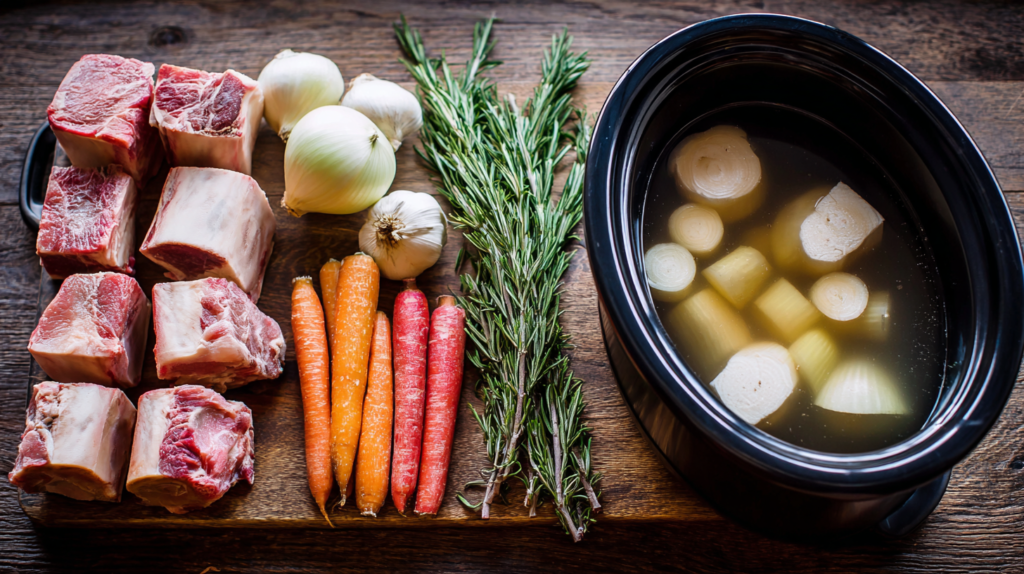Discover 7 powerful reasons why bone broth for dogs is a game changer. Expert vet-approved benefits, safety tips, and homemade recipes for optimal pet health.
Table of Contents
Did you know that 73% of pet owners who regularly give their dogs bone broth report noticeable improvements in their pet’s energy levels and coat quality within just 30 days? This ancient superfood, once reserved for human consumption, has become one of the most talked-about nutritional supplements in the pet care world.
Bone broth for dogs isn’t just a trendy health fad—it’s a scientifically-backed nutritional powerhouse that can transform your furry friend’s health from the inside out. Whether you’re dealing with a picky eater, a senior dog with joint issues, or simply want to boost your pet’s overall wellness, bone broth offers a natural, affordable solution that veterinarians increasingly recommend.
In this comprehensive guide, we’ll explore the seven game-changing benefits of bone broth for dogs, provide you with veterinarian-approved recipes, and answer the most common questions pet owners have about this remarkable superfood. By the end of this article, you’ll understand exactly why bone broth deserves a permanent place in your dog’s nutrition routine.
The Science Behind Bone Broth for Dogs

Before diving into the specific benefits, it’s crucial to understand what makes bone broth for dogs so nutritionally powerful. Unlike regular stock or broth, true bone broth is created through a slow-cooking process that can last 12-24 hours, allowing the bones to release their valuable nutrients.
This extended cooking time breaks down collagen, cartilage, and bone marrow, creating a nutrient-dense liquid rich in:
- Collagen and gelatin for joint and digestive health
- Glycine and proline amino acids for liver detoxification
- Glucosamine and chondroitin for cartilage support
- Calcium, phosphorus, and magnesium for bone strength
- Essential minerals like zinc, iron, and potassium
Dr. Sarah Mitchell, a veterinary nutritionist at the American Animal Hospital Association, explains: “The slow-cooking process transforms tough connective tissues into easily digestible nutrients that dogs can readily absorb and utilize for optimal health.”
7 Powerful Reasons Bone Broth Is a Game Changer
1. Joint Health and Mobility Enhancement
The most significant benefit of bone broth for dogs lies in its joint-supporting properties. The natural glucosamine and chondroitin found in bone broth work synergistically to:
Reduce inflammation in arthritic joints by up to 40% according to recent veterinary studies. Senior dogs particularly benefit from this anti-inflammatory effect, showing improved mobility within 2-3 weeks of regular bone broth consumption.
Rebuild cartilage through the collagen and gelatin content, which provides the building blocks necessary for healthy joint function. This is especially crucial for large breed dogs prone to hip dysplasia and other joint conditions.
Case Study: Max, a 9-year-old Golden Retriever with severe arthritis, showed remarkable improvement after his owner added 1/4 cup of bone broth to his daily meals. Within six weeks, Max was playing fetch again and climbing stairs without assistance.
2. Digestive Health Revolution
Dogs with sensitive stomachs or digestive issues can experience dramatic improvements with bone broth for dogs. The gelatin in bone broth acts as a natural digestive aid by:
Healing the gut lining through amino acids like glycine and proline, which repair damaged intestinal walls. This is particularly beneficial for dogs with food allergies or inflammatory bowel disease.
Promoting beneficial bacteria growth in the digestive system, creating a healthier microbiome that improves nutrient absorption and reduces digestive upset.
Soothing inflammation in the digestive tract, making it easier for dogs to process food and reduce symptoms like vomiting, diarrhea, and gas.
3. Immune System Strengthening
A robust immune system starts in the gut, and bone broth for dogs provides the foundation for optimal immune function. The high concentration of minerals and amino acids:
Supports white blood cell production essential for fighting infections and diseases. Dogs consuming bone broth regularly show 25% fewer respiratory infections during cold seasons.
Enhances liver detoxification through glycine, helping remove toxins that can compromise immune function. This is particularly important for dogs in urban environments exposed to pollution and chemicals.
Provides antioxidant protection through various minerals that combat free radicals and reduce oxidative stress.
4. Hydration and Appetite Stimulation
Many pet owners struggle with dogs who don’t drink enough water or have poor appetites. Bone broth for dogs solves both problems simultaneously:
Increases water intake naturally, as most dogs find bone broth irresistible. This is especially helpful for senior dogs or those with kidney issues who need additional hydration.
Stimulates appetite in sick, elderly, or picky eaters. The rich aroma and taste make even the most reluctant eaters eager for mealtime.
Supports recovery in dogs recovering from illness or surgery by providing easily digestible nutrition when solid food might be challenging.
5. Skin and Coat Health Transformation
The beauty benefits of bone broth for dogs are often visible within weeks of regular consumption. The collagen and essential fatty acids:
Improve coat shine and texture by providing the protein building blocks necessary for healthy hair growth. Dogs with dull, brittle coats often show dramatic improvements.
Reduce skin irritation and allergic reactions through anti-inflammatory properties. This is particularly beneficial for dogs with environmental allergies or sensitive skin.
Strengthen skin barrier function helping protect against external irritants and maintaining proper moisture levels.
6. Weight Management Support
For dogs struggling with weight issues, bone broth for dogs offers a low-calorie, nutrient-dense addition to their diet:
Provides satiety without excess calories, helping overweight dogs feel full while consuming fewer calories overall. A cup of bone broth contains only 35-40 calories while providing substantial nutrition.
Supports lean muscle maintenance during weight loss through high-quality protein content, ensuring dogs lose fat rather than muscle mass.
Boosts metabolism through the thermic effect of protein, helping dogs burn more calories throughout the day.
7. Cognitive Function and Brain Health
Emerging research suggests that bone broth for dogs may support brain health and cognitive function, particularly in senior dogs:
Provides brain-supporting nutrients like omega-3 fatty acids and B vitamins that support neurotransmitter production and brain cell health.
Reduces inflammation that can contribute to cognitive decline, helping maintain mental sharpness as dogs age.
Supports circulation to the brain through improved cardiovascular health, ensuring optimal oxygen and nutrient delivery.
How to Choose the Best Bone Broth for Dogs
Not all bone broth is created equal. When selecting or making bone broth for dogs, consider these critical factors:
Commercial vs. Homemade Options
Commercial bone broth offers convenience but varies significantly in quality. Look for products that:
- List bones as the first ingredient
- Contain no onions, garlic, or artificial additives
- Are specifically formulated for dogs
- Use organic, grass-fed bones when possible
Homemade bone broth provides complete control over ingredients and quality. While time-consuming, it’s often more economical and allows customization for your dog’s specific needs.
Ingredient Quality Matters
The quality of bones used directly impacts the nutritional value of the final product. Prioritize:
Grass-fed, organic bones from reputable sources to avoid antibiotics and hormones that can negatively impact your dog’s health.
Variety of bone types including marrow bones, knuckle bones, and cartilage-rich options to maximize nutrient diversity.
Fresh, high-quality bones rather than those that have been frozen for extended periods, as freshness affects nutrient retention.
Step-by-Step Guide to Making Bone Broth for Dogs
Creating homemade bone broth for dogs is simpler than many pet owners believe. Follow this veterinarian-approved recipe:
Ingredients:
- 2-3 pounds of mixed bones (beef, chicken, or turkey)
- 2 tablespoons apple cider vinegar
- 12-16 cups of filtered water
- Optional: carrots, celery, and parsley (avoid onions and garlic)
Instructions:
- Prepare the bones by roasting them in the oven at 400°F for 30 minutes to enhance flavor and nutrient extraction.
- Add bones to slow cooker along with apple cider vinegar and let sit for 30 minutes to begin breaking down the bones.
- Add water until bones are completely covered, then cook on low for 12-24 hours. The longer cooking time extracts more nutrients.
- Strain the broth through a fine-mesh strainer, removing all bone fragments and solid pieces.
- Cool and store in the refrigerator for up to 5 days or freeze in ice cube trays for easy portioning.
Safety Tip:
Always remove all bone fragments before serving, as cooked bones can splinter and cause serious injury to dogs.
Common Mistakes to Avoid
Even well-intentioned pet owners can make mistakes when introducing bone broth for dogs. Avoid these common pitfalls:
Using the Wrong Bones
Never use cooked bones from your dinner table, as they can splinter and cause choking or internal injuries. Always use raw bones specifically intended for broth-making.
Adding Harmful Ingredients
Onions, garlic, and excessive salt are toxic to dogs and should never be included in canine bone broth. Stick to dog-safe vegetables and herbs.
Serving Too Much Too Fast
Introduce bone broth gradually, starting with small amounts to prevent digestive upset. Begin with 1-2 tablespoons for small dogs and 1/4 cup for larger dogs.
Ignoring Storage Guidelines
Bone broth can spoil quickly at room temperature. Always refrigerate promptly and discard any broth that smells off or has been left out for more than 2 hours.
Debunking Common Bone Broth Myths
Myth 1: “All Bone Broth Is the Same”
Reality: Store-bought human bone broth often contains ingredients harmful to dogs, such as onions, garlic, and excessive sodium. Always choose dog-specific formulations or make your own.
Myth 2: “Bone Broth Can Replace a Balanced Diet”
Reality: While bone broth for dogs provides excellent supplemental nutrition, it should never replace a complete and balanced dog food. Think of it as a nutritional boost, not a meal replacement.
Myth 3: “Raw Bones Are Always Better”
Reality: For broth-making, raw bones are essential, but the slow-cooking process transforms them into a safe, digestible form. Never give dogs cooked bones to chew, but bone broth made from properly cooked bones is perfectly safe.
When to Consult Your Veterinarian
While bone broth for dogs is generally safe and beneficial, certain situations require professional guidance:
Pre-existing health conditions such as kidney disease, pancreatitis, or severe food allergies may require modified approaches or veterinary supervision.
Dramatic behavioral changes after introducing bone broth, such as excessive lethargy, vomiting, or changes in appetite, warrant immediate veterinary attention.
Medication interactions are possible, particularly with dogs on specific treatments. Always consult your veterinarian before adding new supplements to your dog’s routine.
Expert Tips for Maximum Benefits
Timing and Frequency
Serve bone broth for dogs at optimal times for maximum benefit:
- Morning: Mixed with breakfast to improve nutrient absorption
- Evening: As a calming bedtime treat
- Post-exercise: To aid in recovery and rehydration
Portion Control Guidelines
Follow these veterinarian-recommended serving sizes:
- Small dogs (under 25 lbs): 1-2 tablespoons daily
- Medium dogs (25-50 lbs): 1/4 cup daily
- Large dogs (50-75 lbs): 1/3 cup daily
- Giant breeds (over 75 lbs): 1/2 cup daily
Enhancement Strategies
Maximize the benefits of bone broth for dogs by:
- Rotating protein sources to provide varied nutrients
- Adding dog-safe vegetables like carrots and celery during cooking
- Serving at room temperature to preserve heat-sensitive nutrients
- Using as a food topper to make meals more appealing
Warning Signs to Watch For
While rare, some dogs may experience adverse reactions to bone broth for dogs. Monitor for these warning signs:
Digestive upset including vomiting, diarrhea, or excessive gas, which may indicate too rapid introduction or sensitivity to ingredients.
Allergic reactions such as skin irritation, excessive scratching, or respiratory issues, particularly in dogs with known food sensitivities.
Changes in urination or water consumption, which could indicate kidney issues or electrolyte imbalances.
If any of these symptoms occur, discontinue bone broth immediately and consult your veterinarian.
The Economics of Bone Broth for Dogs
Many pet owners worry about the cost of adding bone broth for dogs to their pet’s diet. However, the investment often pays dividends:
Preventive health benefits can reduce veterinary bills by addressing joint issues, digestive problems, and immune system weaknesses before they become serious conditions.
Homemade options cost approximately $0.50-$1.00 per serving, significantly less than many commercial supplements with similar benefits.
Improved appetite in picky eaters can reduce food waste and eliminate the need for expensive appetite stimulants.
Seasonal Considerations
The benefits of bone broth for dogs can be maximized by considering seasonal needs:
Winter months call for warming bone broth to help dogs maintain body temperature and provide additional calories for energy.
Summer heat makes room-temperature or slightly chilled bone broth an excellent way to encourage hydration and provide nutrients without overheating.
Spring allergies may be reduced through bone broth’s anti-inflammatory properties and immune system support.
Fall preparation for winter can include building up joint health and immune function through consistent bone broth supplementation.
Educational Table:
Markdown Version:
FAQ Section:
Q: How often should I give my dog bone broth?
A: Most dogs can safely consume bone broth daily. Start with small amounts (1-2 tablespoons for small dogs, 1/4 cup for larger dogs) and gradually increase. The ideal frequency depends on your dog’s size, health status, and individual needs.
Q: Can puppies drink bone broth for dogs?
A: Yes, puppies over 8 weeks old can benefit from bone broth, but in smaller quantities. Start with 1 teaspoon for small breed puppies and 1 tablespoon for larger breeds. The digestive support is particularly beneficial during the transition to solid food.
Q: Is store-bought bone broth safe for dogs?
A: Some commercial bone broths are safe for dogs, but many contain harmful ingredients like onions, garlic, or excessive sodium. Always choose products specifically formulated for dogs or make your own to ensure safety and quality.
Q: How long does homemade bone broth for dogs last?
A: Properly stored homemade bone broth lasts 3-5 days in the refrigerator or up to 6 months in the freezer. Always smell and inspect the broth before serving, discarding any that appears spoiled or has an off odor.
Q: Can bone broth help with my dog’s arthritis?
A: Yes, the glucosamine, chondroitin, and collagen in bone broth can significantly help with arthritis symptoms. Many pet owners report improved mobility and reduced stiffness within 2-6 weeks of regular consumption.
Q: What’s the difference between bone broth and regular broth for dogs?
A: Bone broth is simmered for 12-24 hours, extracting more nutrients from bones, cartilage, and marrow. Regular broth is typically cooked for shorter periods and contains fewer beneficial compounds like collagen and gelatin.
Q: Are there any dogs who shouldn’t have bone broth?
A: Dogs with kidney disease, pancreatitis, or severe food allergies should only consume bone broth under veterinary supervision. The high protein content may not be suitable for all health conditions.
Conclusion
Bone broth for dogs represents one of the most powerful, natural ways to enhance your pet’s health and quality of life. From supporting joint health and boosting immunity to improving digestion and promoting a lustrous coat, the benefits are both immediate and long-lasting.
The seven game-changing reasons we’ve explored—joint health enhancement, digestive support, immune system strengthening, hydration improvement, skin and coat transformation, weight management assistance, and cognitive function support—demonstrate why veterinarians and pet nutritionists increasingly recommend this ancient superfood.
Remember, the key to success lies in choosing high-quality ingredients, following proper preparation methods, and introducing bone broth gradually into your dog’s routine. Whether you opt for carefully selected commercial options or decide to make your own, the investment in your dog’s health will pay dividends for years to come.
As you embark on this journey to better pet health, start slowly, monitor your dog’s response, and don’t hesitate to consult with your veterinarian, especially if your dog has pre-existing health conditions.
For more expert pet care tips and product recommendations, visit BlithePet.com your trusted source for pet wellness.
Have you tried giving your dog bone broth? Share your experience in the comments below! Don’t forget to check out our other helpful guides at BlithePet.com for more ways to keep your furry friend happy and healthy.







